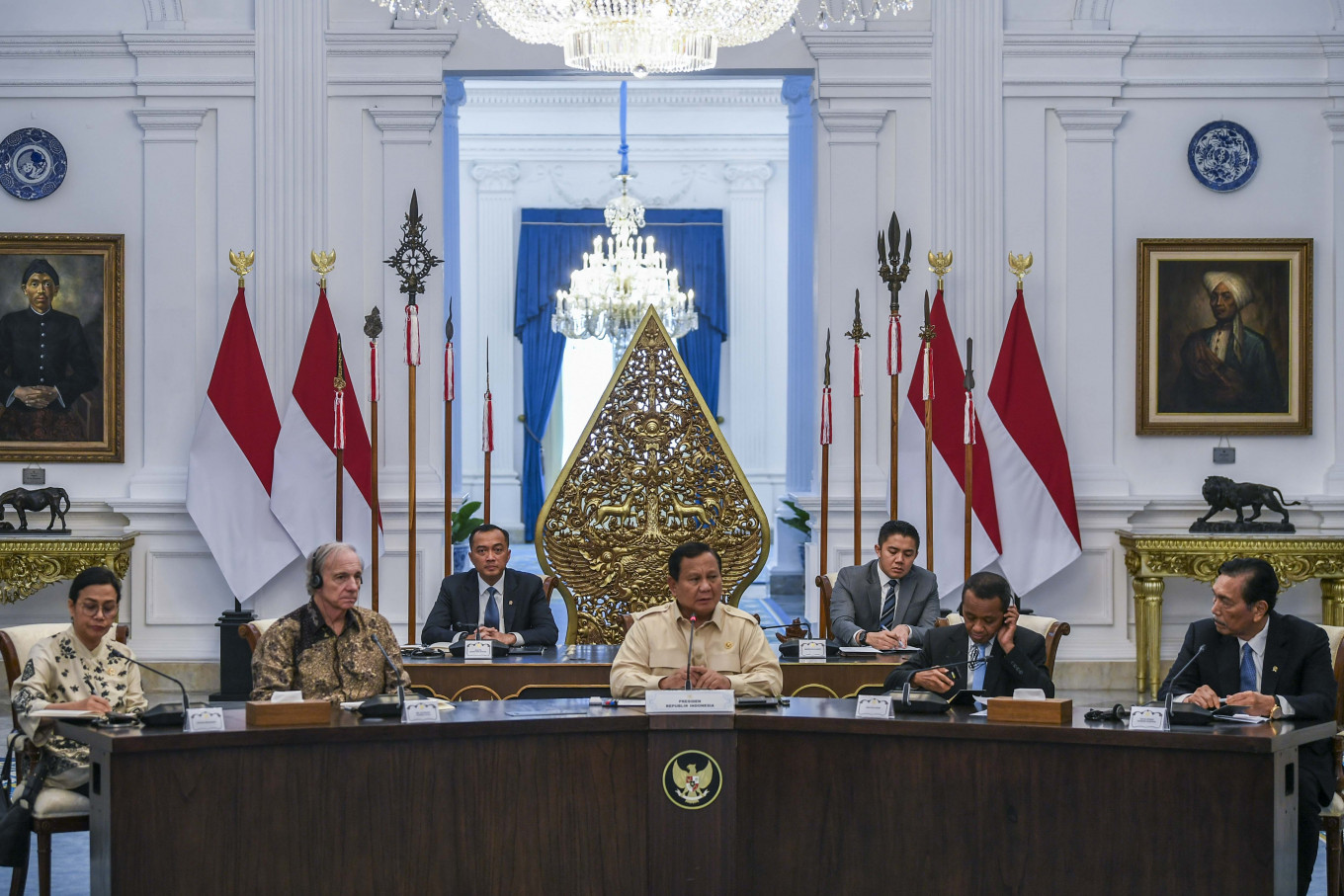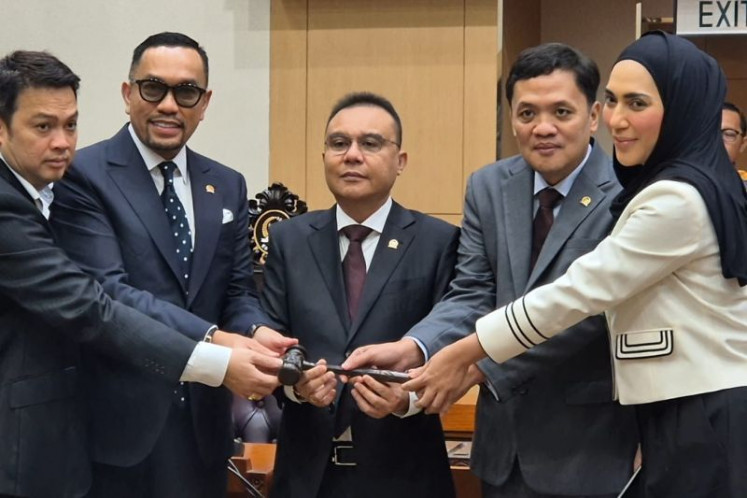Popular Reads
Top Results
Can't find what you're looking for?
View all search resultsPopular Reads
Top Results
Can't find what you're looking for?
View all search resultsDasco dispels rumor of Sri Mulyani's resignation
The House Deputy Speaker has dismissed a growing rumor that the finance minister plans to resign, saying he had confirmed with the President that this was not the case.
Change text size
Gift Premium Articles
to Anyone
 President Prabowo Subianto (center) presides over a meeting at Merdeka Palace in Jakarta on March 7, 2025, with (from left) Finance Minister Sri Mulyani, United States businessman Ray Dalio, State Secretary Prasetyo Hadi, Cabinet Secretary Teddy Indra Wijaya, Energy and Mineral Resources Minister Bahlil Lahadalia and National Economic Council (DEN) chairman Luhut Binsar Pandjaitan, on managing the assets of state-owned enterprises through the Daya Anagata Nusantara (Danantara) sovereign wealth fund. (Antara Foto/Galih Pradipta)
President Prabowo Subianto (center) presides over a meeting at Merdeka Palace in Jakarta on March 7, 2025, with (from left) Finance Minister Sri Mulyani, United States businessman Ray Dalio, State Secretary Prasetyo Hadi, Cabinet Secretary Teddy Indra Wijaya, Energy and Mineral Resources Minister Bahlil Lahadalia and National Economic Council (DEN) chairman Luhut Binsar Pandjaitan, on managing the assets of state-owned enterprises through the Daya Anagata Nusantara (Danantara) sovereign wealth fund. (Antara Foto/Galih Pradipta)
F
inance Minister Sri Mulyani Indrawati has no plans to resign from the Red and White Cabinet, a close confidant of President Prabowo Subianto said on Friday, adding that a cabinet reshuffle was not in the pipeline.
House of Representatives Deputy Speaker Sufmi Dasco Ahmad said he had confirmed with Prabowo himself that no cabinet shake-up was imminent.
Dasco, who is a senior politician in Prabowo's Gerindra Party, also said the President and Sri Mulyani remained on good terms, and that they demonstrated mutual respect and cordiality in their last meeting.
"What I learned yesterday was there was indeed a breaking-of-the-fast meeting between the two, during which they discussed the latest economic situation [...] I also checked with the government, there is no plan for a reshuffle," Dasco said on Friday, as quoted by Kompas.com.
However, the senior politician acknowledged he had yet to speak with Sri Mulyani about her rumored resignation, as he had not had “the chance to confirm with her".
Speculation has been rife in recent weeks that the finance minister is heading for the door due to disappointment over her diminished role in the cabinet. Unconfirmed reports suggest her current deputy Thomas Djiwandono, Prabowo's nephew, would take over if Sri Mulyani’s resignation was approved.
Sri Mulyani was already said to be considering a resignation under the previous administration over concerns about ethics breaches leading up to the general election in early 2024.
Back then, the minister was said to be feuding over budgetary issues with Prabowo, who was then the defense minister.
Read also: Speculation mounts over Sri Mulyani resignation
Prabowo, running for the office of president, revealed in an election debate that the Finance Ministry had imposed budget restrictions on his institution that hampered critical defense procurement.
Both ministers ended up staying within the cabinet till the term of then-president Joko “Jokowi” Widodo was up, and the two seemed to have worked out their past differences, given that Prabowo offered Sri Mulyani her old seat as finance minister, which she took.
Sri Mulyani has neither confirmed nor denied the latest rumors about her possible departure.
When pressed by reporters on Wednesday following her meeting with President Prabowo at the Presidential Palace compound, the trained economist declined to respond.
Sri Mulyani has served under three presidents in two different offices. The first government position she filled was head of the National Development Planning Agency (Bappenas) under president Susilo Bambang Yudhoyono in 2004 and 2005.
She later became the finance minister, before joining the World Bank in 2010. Jokowi offered her the position of finance minister in 2016, which she has held until today.
During her long tenure as state treasury manager, Sri Mulyani has become an icon of fiscal prudence in whom investors and financial market traders put their trust.
Analysts argued last year that her hypothetical exit might have led to investors pulling out and that it would taint the President’s image.
However, Center of Economic and Law Studies (CELIOS) executive director Bhima Yudhistira doubted that the market would experience a shakeup if Sri Mulyani were to leave soon. In fact, he blamed the recent drop in the capital markets instead on negative sentiment around the “current state budget governance model,” even with Sri Mulyani in office.
He told The Jakarta Post on Friday that market trust in Indonesia would increase if the administration managed to find a figure with credibility, experience and discipline to replace the minister.
“Sri Mulyani’s replacement must be capable of learning from past mistakes. First, [he/she] must not be afraid to say ‘no’ to the President’s political pressure with regard to populist programs that require a jumbo budget, meaning that there must be program rationalization; and don’t just be a ‘yes man’,” said Bhima.
He said any successor to Sri Mulyani would need to avoid reliance on debt to finance government spending and should dare to take the risk of imposing progressive taxes, such as carbon or wealth taxes.
Read also: State revenue nosedives in January and February
Sources within the government and the House of Representatives, including House Commission XI, which oversees finance, declined to answer the Post’s enquiries about Sri Mulyani’s possible departure plans.
Commission XI chairman Misbakhun from the Golkar Party replied, “that’s within Pak President’s full authority” when the Post asked about the rumor on Thursday.
Commission XI member Said Abdullah from the Indonesian Democratic Party of Struggle (PDI-P) told the Post on March 5 that “no [discussion] whatsoever” about the matter had been taking place in the commission.
Finance Ministry spokesman Deni Surjantoro told the Post on the same day that he had heard nothing on the matter either.
Presidential spokesman Hasan Nasbi told the Post on Friday that, "so far, it's all just rumor and speculation".
Editor’s note: This story has been updated with additional comments and background.










